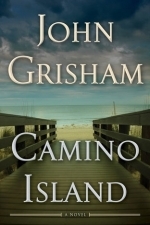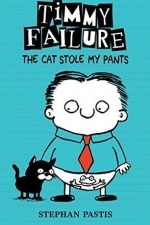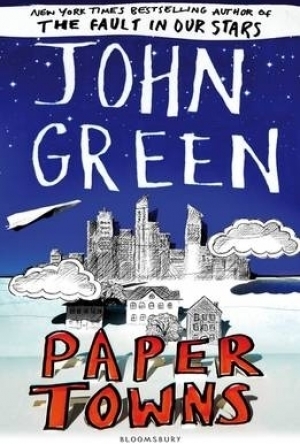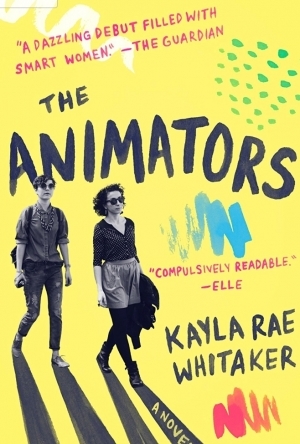Kara Skinner (332 KP) rated A Gift of Ghosts in Books
Jun 11, 2019
My rating: 4 out of 5 stars
Goodreads Rating: 4.01 out of 5 stars
Page Count: 190 pages
One little paragraph about spirit energy ruined Akira’s career as an academic professor. Now she has two options: get a job at General Directions, a mysterious company in Florida that wants to interview her for some reason, or teach high school physics.
She’d rather work in Hell than teach high school physics.
Luckily, General Directions offers her a job that includes a salary increase and also the freedom to research whatever she wants as long as she signs a two-year contract.
What she doesn’t know is they don’t want her for her scientific research. They want her because she sees ghosts. Her boss, Zane, and the company’s CEO (and Zane’s dad), Max, want her to contact Zane’s mother and nephew, who passed, but may still be in the ghost world.
Now Akira is living in a town full of psychics where she has a haunted car and a haunted house– luckily, only friendly spirits. Her boss, Zane, is more of a friend than a manager. Which is all right with her, because she can’t help but be incredibly attracted to him.
But when Akira finds out that Zane’s mother has turned into an evil spirit, tensions rise. How can she make Zane understand that she can’t talk to his mother because the mother might kill Akira in the process?
This book was incredibly good. Way better than I was expecting, especially after I realized that Zane was going to be Akira’s boss. Normally I don’t like boss-employee romances because it feels icky. But Zane really didn’t manage Akira at all, and was a boss in name only. Not only that, but Akira seduced Zane, which was a refreshing change of pace.
Zane and Akira were both incredibly sexy and complemented each other so well. I loved the two of them together and the way Zane desired to protect her while also respecting her ability to protect herself was amazing.
The entire town, which is an homage to Eureka, was adorable and pulled me right into the world. I also really liked all the ghosts Akira encountered. They were complex enough to feel like real people even though they were for the most part side characters.
The ghostlore was intriguing as well and I enjoyed watching the discoveries Akira made about the afterlife as the story unfolded. Despite being able to see ghosts her entire life, her knowledge about ghosts was limited because of her overprotective father who forbade her to talk to ghosts or think of them as anything other than leftover energy.
The climax was satisfying for the most part. However, for a few minutes, Zane doubted that Akira could see ghosts, which was really weird. For most of the book, he didn’t doubt her ability at all, especially after testing her ability to see ghosts many times. But suddenly he doubts it? His reasoning for it didn’t fly for me and it was pretty annoying. But once he shook off his out-of-character skepticism, I was enjoying the story again.
The only other problem I had in the book was towards the beginning where there were a few random formatting marks visible. Not enough to really mess with the story, but it was a little distracting nevertheless.
But overall, this was an awesome, slightly spooky romance that’s perfect for October.
Kristy H (1252 KP) rated Camino Island in Books
Feb 1, 2018
I have a soft spot for Grisham, that's for sure. I fell in love with his first novels as a young teen, and I still love Darby Shaw, Gray Grantham, Mark Sway, Reverend Roy, and Reggie Love as if they were real people. Grisham and his family have a home in my town, and we claim him as one of our own. His books are often an easy escape, and CAMINO ISLAND falls into that category. Is it as memorable as [b:The Pelican Brief|32499|The Pelican Brief|John Grisham|https://images.gr-assets.com/books/1389486877s/32499.jpg|490324] or [b:The Client|5359|The Client|John Grisham|https://images.gr-assets.com/books/1388632222s/5359.jpg|137715]? No. Is it a fun diversion for a few days? Sure.
CAMINO ISLAND is a change from most of Grisham's legal thrillers--there are no lawyers or court room scenes here, just some tricky criminals, a heist, and the aftermath. You'll need to keep track of the various bad guys in the beginning, but once you get past that, it's an easy breezy read--much like the Florida setting where most of the novel is set. Mercer's a pleasant, albeit not very complicated protagonist, and Bruce Cable is a trip. It's also a detailed exploration into the world of rare books--something I knew little to nothing about.
Overall, this is fun, easy thriller. There are a few twists and turns along the way to keep you interested, and Grisham's characters are always enjoyable. The ending wraps up fairly quickly after all the build-up, so be prepared for that. Is it Grisham's best? No. But it will keep you entertained for a couple of days. 3.5 stars.
You can read my reviews of Grisham's novels GRAY MOUNTAIN <a href="https://www.goodreads.com/book/show/20707959-gray-mountain">here</a>; and ROGUE LAWYER <a href="https://www.goodreads.com/book/show/25387351-rogue-lawyer">here</a>;.
<center><a href="http://justacatandabookatherside.blogspot.com/">Blog</a>; ~ <a href="https://twitter.com/mwcmoto">Twitter</a>; ~ <a href="https://www.facebook.com/justacatandabook/">Facebook</a>; ~ <a href="https://plus.google.com/u/0/+KristyHamiltonbooks">Google+</a>; ~ <a href="https://www.instagram.com/justacatandabook/">Instagram</a>; </center>
Hazel (1853 KP) rated Timmy Failure: The Cat Stole My Pants in Books
Dec 17, 2018
For fans of <i>Diary of a Wimpy Kid</i> (Kinney, 2004) is a juvenile series by American author, Stephan Pastis, about a young boy who believes he is the world’s greatest detective. A series that is continually growing, the sixth <i>Timmy Failure </i>story is now available for fans and new readers. Subtitled <i>The Cat Stole My Pants</i>, Timmy Failure embarks on an adventure of mystery and crime solving whilst getting himself into all sorts of mischief.
Emulating both real and fictional detectives, Timmy has established his own agency, Failure, Inc., of which he is the sole employee after the flight of his (imaginary) ex-business partner, Total the polar bear, who is currently seeking political asylum in Cuba. Unfortunately, Timmy has been forced to join his mother and Doorman Dave on their honeymoon in Key West, Florida, along with Doorman Dave’s nephew, Emilio.
“Crime doesn’t take a holiday. Neither does greatness.” Determined to continue solving crimes, Timmy hires Emilio as an unpaid intern and sets off searching for crimes, greatly over exaggerating every little piece of “evidence” he finds. However, it soon appears that someone is out to get Timmy and he, along with Emilio, is determined to find out whom.
Timmy is a melodramatic, unconventional child with a large ego and is constantly getting told off. From annoying adults to having his pants stolen by a polydactyl cat – or so he claims – there is no end to the hilarious situations he causes.
The cat that stole Timmy’s pants only makes a brief appearance in the book, therefore the subtitle is more to attract the attention of young readers with its silliness rather than be suggestive of a certain storyline.
Despite his grand claims, Timmy is not a very good detective and a lot of his unsolved crimes have been invented by his overactive imagination. This adds to the humour because, although he seems like an intelligent child, his ideas are completely silly.
Adorned with childish drawings and diagrams, Timmy Failure narrates the story from his subjective point of view, inflating his successes and blaming any failure on poor Emilio. No one takes Timmy seriously, which is something many of the target readers may appreciate, although they should also understand how futile Timmy’s attempts are at being a detective.
The storyline is not particularly clear until the final chapters of the book. Up until that moment, the book is full of disastrous, imaginary detective endeavours that prove Timmy to be nothing more than an annoying, inventive boy.
Some of the language may be above children’s reading capabilities, however, the humour is directly on their level. Whereas an adult may not find the idea of a cat stealing someone’s pants amusing, a child would find that hysterical.
There is no reason to read the <i>Timmy Failure</i> books in order, so if you, like me, read book six first, there is no problem. The stories are particularly aimed at young boys and will hopefully encourage the demographic to start reading more. Whilst it may not be a great feat of literature, it is a good enough introduction to the world of books.

SIMON - Malls, Mills & Premium Outlets for iPad
Shopping and Lifestyle
App
SIMON, NOW FOR YOUR iPAD. The official SIMON iPad app for every savvy shopper that visits one of the...

TUI Holiday Deals & Offers
Travel and Lifestyle
App
The TUI app gives you everything you need for your holiday –anytime, anywhere. And now, to make...

Emergency Radio (Police Scanner)
News and Utilities
App
ON SALE FOR A LIMITED TIME IN CELEBRATION OF OUR LATEST UPDATE! ...

Broken Justice
Book
Cameron Justice- former Special Forces Veteran and now working along side his Justice Brothers Alex...
justicebrothers familyjustice4life suzannehalliday
Hazel (1853 KP) rated Paper Towns in Books
May 30, 2017
Set in Orlando, Florida, Paper Towns is narrated by eighteen-year-old Quentin Jacobson (often referred to as Q). It begins with a flash back to when he and next door neighbour, Margo Roth Spiegelman, were nine and discovered a dead body in the park. It is here that the differences in character are pointed out: “As I took those two steps back, Margo took two equally small and quiet steps forward.” Q is an anxious boy, whereas Margo comes across as very confident.
Despite their childhood relationship, for the main bulk of the story Q and Margo have grown apart. They belong to different social circles: Margo to the popular crowd and Q with the gamers, band members and social outcasts. But things take a turn when one night Margo climbs through Q’s bedroom window and insists he accompany her on a nighttime adventure, going around righting wrongs and wronging rights.
But the next day Margo runs away telling no one where she is going, except it appears that she has left clues to her whereabouts. Clues only intended for Q to discover. With the help of his prom-obsessed friend, Ben; Radar, the guy whose parents own the world’s largest collection of black Santas (seriously, where does Green come up with this stuff?); and Lacey, Margo’s best friend and Ben’s soon to be girlfriend; Q struggles to understand the clues and uncover Margo’s hiding place.
To begin with it is exciting to read about Q and his friends unscrambling the hidden messages but as the story goes on and Margo is yet to be found a sense of dread creeps up on us and Q begins to think the worst.
The final section, however, is fast past and thrilling to read as the characters travel across states, with a rather short time limit, in Q’s mini van in a final attempt to find Margo. What will they find when they arrive? Will Margo still be there?
At first I was not sure that I would like this book. Chapter one is mostly about Quentin, Ben and Radar fooling around as boys do, but once everything kicks off with Margo it is really exciting. Similarly to The Fault in our Stars, Green has filled Paper Towns with clever metaphors with paper, string, balloons and grass being used to represent life. It is a very witty narrative containing lots of humour, yet also manages to convey important ideas about the way we see the world, and the people in it.
Paper Towns can be described as a contemporary, coming-of-age story. As mentioned already, Margo was portrayed as a confident girl whereas Quentin was the opposite. Despite Q stating “I wanted Margo’s disappearance to change me; but it hasn’t, not really” I think Green has shown major character developments, and possibly even role reversals. Q may never completely get rid of his anxieties and does not totally become a different person, but he does gain more confidence as he is forced out of his comfort zone, and his perception of other people also begins to alter. Margo on the other hand may not be all that she seems. The real Margo may in fact be a quiet, rather lost teen in a world she feels trapped in. I think this story and Q’s development has the potential to inspire others of similar ages and make all readers question things about themselves.
Overall, an exceptionally good read.
Kristy H (1252 KP) rated The Animators in Books
Feb 13, 2018
This book is insane and amazing. I honestly had no idea what it was about when I started to read it; I surely had read the ARC blurb when I chose it, but had forgotten by the time I began, and the cover art seems to indicate a light-hearted tale about movies and animation. It is not. This is a powerful, gut-wrenching novel that will drag you into its story and characters and eventually spit you out, exhilarated and exhausted. There was so much about this novel I loved and related to: the fast friendship of two girls in college; an actual lead lesbian character (but whose lesbianism wasn't her only defining aspect - how refreshing); Sharon and her doubts and insecurities - the way she feels as if she's disappearing into herself in her thirties; the way Whitaker so easily captured growing up in a rural town (Sharon's Kentucky hometown)... I immediately identified with both characters, although Sharon is our protagonist, and the one telling us our story.
I won't lie to you: this book will make you feel uncomfortable. It's not a fun read, or really even a pleasant one. It's not a "feel good novel." It hurts--physically hurts--to read this book. Some of the novel is uneven, and it jumps around a bit. This is Whitaker's first novel, and I think she's only going to get more amazing as she goes, because you can look past this, and see so much power and force in this book. It's raw. It's the story of a friendship, and it's told so beautifully that you are completely drawn into Mel and Sharon's world. When you read this book, there is really nothing else going on in your life but this novel. Mel and Sharon are real, you love them, and you can see them in your mind. (I saw Mel as Kate McKinnon, despite the references to Lori Petty.) The storyline, for me, was unexpected, and, as I said, jumped a bit, but it worked. I had one issue with the end (a bit of a cliche about straight/lesbian friendship, but I won't go into it much, for spoiler reasons), but otherwise, found this novel to be energetic and forceful. It's dark, it's an ode to art and friendship and life, it's deep - I really have no words. It will take you to an exposed place inside of yourself, but you'll be glad it did.
I received a copy of this novel from the publisher and Netgalley (thank you!) in return for an unbiased review; it is available everywhere as of 1/31/2017.

Piano app by Yokee
Music and Games
App
-- PLAY THE HOTEST SONGS. NO EXPERIENCE NECESSARY. -- Play timeless Piano classics and popular radio...




